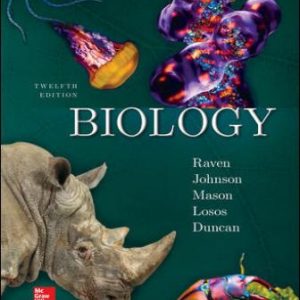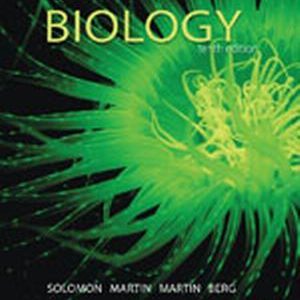Description
Solution Manual for Thinking About Biology: An Introductory Lab Manual 6th Edition Bres
Solution Manual for Thinking About Biology: An Introductory Lab Manual, 6th Edition, Mimi Bres, Arnold Weisshaar, ISBN-10: 0134826892, ISBN-13: 9780134826899, ISBN-10: 0134765621, ISBN-13: 9780134765624
Table of Contents
Exercise 1 Introduction to the Scientific Method
Activity 1 Forming Hypotheses to Solve Problems
Activity 2 Testing Hypotheses
Activity 3 Interpreting Data
Activity 4 Performing an Experiment and Collecting Data
Activity 5 Graphing Your Results
Activity 6 Interpreting Data Using Simple Statistics
Exercise 2 Windows to a Microscopic World
Activity 1 Learning to Use the Dissecting Microscope
Activity 2 Making Observations with the Dissecting Microscope
Activity 3 Getting Familiar with the Compound Microscope
Activity 4 Parts of the Compound Microscope
Activity 5 Learning to Use the Compound Microscope
Activity 6 Preparing Temporary Slides – Wet Mounts
Activity 7 Using the Microscope to Answer a Question: What Do Aquarium Snails Eat?
Exercise 3 Functions and Properties of Cells
Activity 1 Cellular Organelles
Activity 2 Observing Living Cells
Activity 3 Amyloplasts in Potato Tubers
Activity 4 Stem Cells
Exercise 4 Movement of Molecules Across Cell Membranes
Activity 1 Water Molecules in Motion
Activity 2 Diffusion and Osmosis
Activity 3 Controls for the Diffusion and Osmosis Experiment
Activity 4 Completing the Diffusion and Osmosis Experiment
Activity 5 Osmosis in Elodea Cells
Exercise 5 Investigating Cellular Respiration
Activity 1 Do Microorganisms Perform Cellular Respiration?
Activity 2 Comparison of Classroom Air with Exhaled Air
Activity 3 Effect of Exercise on Carbon Dioxide Production
Activity 4 Alternatives to Aerobic Respiration
Activity 5 Anaerobic Respiration
Exercise 6 Photosynthesis
Activity 1 Absorption of Carbon Dioxide During Photosynthesis
Activity 2 Testing Leaves for Starch
Activity 3 Cells of the Leaf Epidermis
Exercise 7 Organic Molecules and Nutrition
Activity 1 Positive and Negative Indicator Tests
Activity 2 Testing Food Samples
Activity 3 An Embryo in a Peanut Seed
Activity 4 Dietary Intake and Good Health
Exercise 8 Factors that Affect Enzyme Activity
Activity 1 Demonstration of Enzyme Activity
Activity 2 Enzyme Activity in Food Vacuoles
Activity 3 Effect of Environmental Conditions on Protein Structure
Exercise 9 Introduction to Molecular Genetics
Activity 1 Removing DNA From Cells
Activity 2 The Basics of DNA Structure
Activity 3 Building a Model of DNA
Activity 4 Steps of Protein Synthesis
Activity 5 Building a Real Protein
Exercise 10 Mitosis and Asexual Reproduction
Activity 1 How Mitosis Works
Activity 2 Recognizing the Stages of Mitosis
Activity 3 Mitosis – The Real Thing!
Activity 4 Estimating the Duration of the Cell Cycle
Activity 5 Regeneration
Activity 6 Asexual Reproduction: Growing a Plant From a Cutting
Exercise 11 Connecting Meiosis and Genetics
Activity 1 Getting Started: Build a Pair of Chromosomes
Activity 2 Homologous Chromosomes Separate in Meiosis to Form Gametes
Activity 3 Fertilization: Nature’s Equivalent to Rolling the Dice
Activity 4 What’s Your Baby’s Genotype?
Activity 5 Genotype Determines Phenotype
Activity 6 Passing On Traits
Activity 7 Practicing Genetics Problems
Exercise 12 Human Genetics
Activity 1 PTC Tasting
Activity 2 X-Linked Traits
Activity 3 Codominance and Sickle Cell Disease
Activity 4 A Family History of Sickle Cell Disease
Activity 5 Codominance and Multiple Alleles
Exercise 13 Evolution
Activity 1 Determining the Age of Rock Layers and Fossils
Activity 2 Reconstructing Fossil Evidence
Activity 3 Natural Selection
Exercise 14 Functions of Tissues and Organs
Activity 1 Skin: The Outer Protective Layer
Activity 2 The Epidermis
Activity 3 The Dermis
Activity 4 Hair Today, Gone Tomorrow
Activity 5 Below the Skin (the Hypodermis)
Activity 6 Touch Sensitivity
Exercise 15 The Cardiovascular System
Activity 1 Circulation of Blood Around the Body
Activity 2 A Closer Look at the Heart
Activity 3 Understanding Blood Pressure and Pulse Rate
Activity 4 Cardiovascular Disease
Exercise 16 Introduction to Anatomy: Dissecting the Fetal Pig
Activity 1 Getting Started
Activity 2 Following Anatomical Directions
Activity 3 External Anatomy of the Fetal Pig
Activity 4 Dissection of the Mouth
Activity 5 Dissection of the Neck
Activity 6 Dissection of the Thoracic Cavity
Activity 7 Measuring Lung Capacity
Exercise 17 Organs of the Abdominal Cavity
Activity 1 Dissection of the Abdominal Cavity
Activity 2 The Urinary System
Activity 3 Internal Structure of the Stomach
Activity 4 Examining the Small Intestine
Activity 5 The Importance of Surface Area
Activity 6 Earthworm Locomotion
Exercise 18 Introduction to Forensic Biology
Activity 1 Getting Started
Activity 2 Classifying Fingerprint Patterns
Activity 3 Analyzing Fingerprint Evidence
Activity 4 Blood Typing
Exercise 19 Biotechnology: DNA Analysis
Activity 1 Sources of DNA Evidence
Activity 2 Solving a Crime Using RFLP Fingerprints
Activity 3 The Use of PCR For STR Analysis
Activity 4 Solving a Criminal Case Using STR Evidence
Activity 5 Deciding a Paternity Suit Involving STR Analysis
Activity 6 DNA Barcodes
Exercise 20 Using Biotechnology to Assess Ecosystem Damage
Activity 1 Exploring Bioluminescence
Activity 2 Getting Started
Activity 3 Making Accurate Serial Dilutions
Activity 4 Preparing Bacterial Samples
Activity 5 Testing the Toxicity of Your Chemical
Exercise 21 Ecosystems
Activity 1 Food Chains
Activity 2 Loss of Energy in Food Chains
Activity 3 Food Chains Interact to Form Food Webs
Activity 4 Bioaccumulation
Exercise 22 Biodiversity and Conservation
Activity 1 Value of Biodiversity
Activity 2 Commercial Fishing as an Example of Tragedy of the Commons
Activity 3 Ecosystem Jenga®
Exercise 23 Population Ecology
Activity 1 Introduction to Sampling – An Ecological Tool
Activity 2 Sampling Quadrats to Estimate Population
Activity 3 The Mark and Recapture Technique for Estimating Population Size
Appendix 1 Game Cards for Exercise 22
Appendix 2 Self Test Answers





